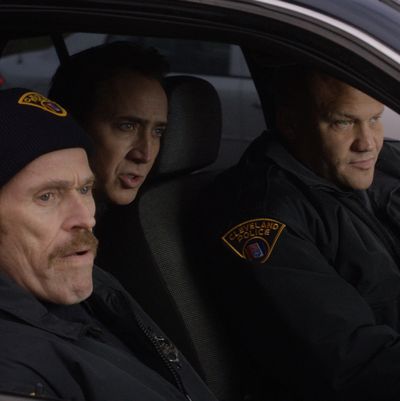
Reviewing The Sting in 1973, Pauline Kael complained that the movie was for people who think of “crooks as sweeties.” How naïve that sounds now. To make sense of it, you have to remember that, before the counterculture, the American film industry’s censors had long ensured that crime would be viewed in the most moralistic terms. When the overt meddling ceased, there was a brief period in which crooks could be magnetic and sexy but at the same time tragically, murderously stupid. The perfect balance was found in Bonnie and Clyde, but it tipped two years later in George Roy Hill and William Goldman’s Butch Cassidy and the Sundance Kid, which shocked Kael because the filmmakers didn’t seem bothered about the scores of Bolivian soldiers that the lovable outlaws were blowing away. (It was the flippant tone that bothered Kael; in his ecstatic carnage in The Wild Bunch, Sam Peckinpah at least had the courage of his nihilism.) In Hill’s The Sting, the lovability quotient shot way up. You weren’t supposed to care that the heroes (Paul Newman and Robert Redford again) made their living cheating people because in this case they were cheating a gangster. Was such mindless amorality better than the censors’ enforced morality? Over the next four decades, filmmakers like Quentin Tarantino have thrown the dilemma in our faces: Just how much are we supposed to like people who do vile things?
I thought of all this watching the exuberantly tacky Dog Eat Dog, directed by Paul Schrader from a script by Matthew Wilder (closely based on a pulp novel by Edward Bunker). The three ex-con thieves played by Nicolas Cage, Willem Dafoe, and Christopher Matthew Cook are “sweeties,” none more touching than Dafoe’s “Mad Dog,” who seems to believe that life can be a long self-improvement project marked by inevitable backward slides into bloodletting. In the pre-credits sequence, he snorts, shoots up, and guts his girlfriend in a sudden rage after she finds he has been visiting a website called “Asian Teen Squirters.” (He also murders her teenage daughter.) This garish scene — drenched in surreal pinks and blues — is a dandy overture, a reminder that these lovable little men who sees themselves as tender and romantic and even Bogie-like existential heroes are psychopaths who’d kill you out of irritation or impatience.
Schrader’s direction is usually more chill, but Dog Eat Dog plays like John Waters with teeth. It’s uproarious — then sobering — then uproarious — then disgusting. Wilder’s script seems to be teasing us, daring us to like Troy (Cage), Diesel (Cook), and Mad Dog. Troy waxes poetic about making enough money to take a pretty blonde hooker to Nice, where the blue of the water and sky come together into something infinitely lovely, but she’s impatient to get back to mailing out head shots and her CD. Troy will later shoot in cold blood a woman who looks a little like her. There’s also remarkable scene between the bald Diesel — whom Troy says, in voiceover, is a “big, lug-nut-looking dude but he’s very bright…In another universe this guy could have been a lawyer from Stanford … Unfortunately, this is not another universe” — and a woman, Zoe (Louisa Krause), who comes up to his hotel room and plays him an Elliott Smith song. Zoe thinks she can be soft around him, but quickly realizes — almost by osmosis — that she’s not safe. (Cook is such a sensitive actor that you almost think he could follow her, and Krause is so wonderful that you almost think she could reach him.)
Dog Eat Dog is full of funny, deadpan shoptalk — funny in a ways that are closer to the dry George V. Higgins than the rococo Tarantino. I was blown away by the guy playing the trio’s matter-of-fact middleman, El Greco: Schrader in his acting debut. El Greco knows Troy is a dope trying to style himself as a brain, but he keeps that to himself. He likes minimal personal risk and good wine and getting the deals done. He responds to the inevitable catastrophe with his temper in check. He’s playing a longer game.
The central event — it comes halfway through the film — is a baby-napping that goes very, very bad, although probably not as bad as it might have gone if you get my drift. The best bit is when Mad Dog blows someone’s head to smithereens (in close-up) and the baby begins to wail and Troy says to the nanny, “Will you shut this baby up? … Where’s the thing you put in the baby’s mouth? What’s it called?” and Mad Dog says, “A dick?” Dafoe is crazy-good. He makes Mad Dog’s madness an extension of his infantilism: When the world doesn’t work the way he thinks it’s supposed to, he kills someone. He’s sad about it, but more because his temper is impediment to personal growth.
I loved almost everything about Dog Eats Dog — until the last ten minutes, when Schrader gets too fancy and Cage (whose desire to push the boundaries of realism often pushes him into camp) lays the Bogie imitation on thick. There’s a transitional sequence that’s in the book but inexplicably missing from the film (Was it cut to bring down the length?), and the narrative lurch has the effect of making the climax seem like an absurdist fantasy, exactly what the story doesn’t need. It might be that Schrader is too ambivalent about his knuckleheaded protagonist to find the right tone. Cage’s Troy isn’t Bogie — or even Cagney. He doesn’t even have the stature for a tongue-in-cheek blowout, especially given the ironic fate of a couple of saintly bystanders. This sweetie-psycho game is a dangerous one. The lines aren’t fixed but you somehow know when they’ve been crossed in the wrong direction.





